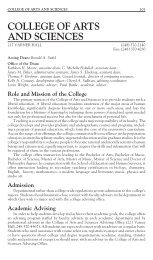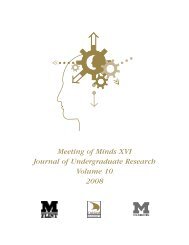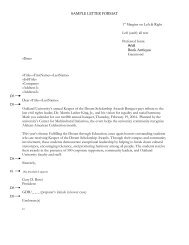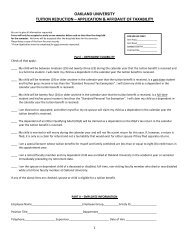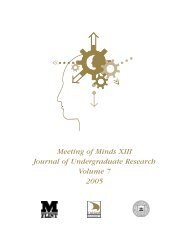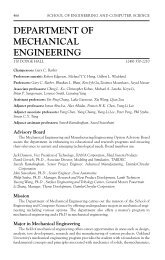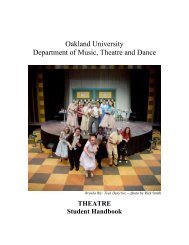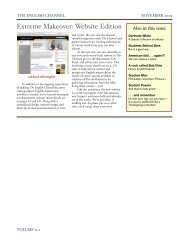MOM 2006 journal for pdf.pmd - University of Michigan-Flint
MOM 2006 journal for pdf.pmd - University of Michigan-Flint
MOM 2006 journal for pdf.pmd - University of Michigan-Flint
Create successful ePaper yourself
Turn your PDF publications into a flip-book with our unique Google optimized e-Paper software.
THE ARTISTRY OF ROBERT LOWELL<br />
Sara Suarez<br />
Faculty Sponsor: Gladys Cardiff<br />
Department <strong>of</strong> English, Oakland <strong>University</strong><br />
The work <strong>of</strong> Robert Lowell is frequently associated with the model <strong>of</strong> confessional poetry.<br />
While Lowell’s poems do contain some elements inspired by personal experience, the work <strong>of</strong><br />
Robert Lowell “is the result not <strong>of</strong> accuracy but the illusion <strong>of</strong> accuracy,” poetry intended to<br />
mimic reality <strong>for</strong> the purpose <strong>of</strong> some type <strong>of</strong> unearthing (Bidart). Lowell’s poems are not<br />
“’intended to be revelatory’ but to be exploratory,” and poems such as “Memories <strong>of</strong> West Street<br />
and Lepke”, “Man and Wife”, and “To Speak <strong>of</strong> Woe That Is in Marriage” exemplify the artistry<br />
<strong>of</strong> Robert Lowell that is commonly mistaken <strong>for</strong> confession (Travisano 44). These poems not<br />
only challenge the confessional label through movement but also through the artistry employed,<br />
illustrated through the changing voice and illusion <strong>of</strong> autobiographical representation <strong>for</strong> the<br />
purpose <strong>of</strong> aesthetic effect, not confession.<br />
Confessional poetry, as defined by Diane Middlebrook, has clearly defined characteristics and<br />
a distinctive voice that is understood to be the voice <strong>of</strong> the poet himself.<br />
[Confessional poetry] investigates the pressures on the family as an<br />
institution regulating middle-class private life, primarily through the<br />
mother. Its principle themes are divorce, sexual infidelity, childhood<br />
neglect, and the mental disorders that follow from deep emotional wounds<br />
received early in life. A confessional poem contains the first-person<br />
speaker, “I”, and always seems to refer to a real person in whose actual life<br />
real episodes have occurred that cause actual pain, all represented in the<br />
poem. (Travisano, 39-40)<br />
While Lowell’s poems frequently deal with such subject matter, the first person “I” is not<br />
necessarily representative <strong>of</strong> Lowell himself. The inspiration drawn from real life events creates<br />
“the illusion that the poem is not art but a report on life, that the reader is getting ‘the real Robert<br />
Lowell’” (Bidart).<br />
The opening <strong>of</strong> “Memories <strong>of</strong> West Street and Lepke” seems to be a direct depiction <strong>of</strong> the<br />
genuine daily life <strong>of</strong> Robert Lowell. Beginning the poem with the illusion <strong>of</strong> a commentary on<br />
the actual life <strong>of</strong> the poet himself allows Lowell to lay the foundation <strong>for</strong> regression into a halfinvented<br />
past, without compromising the appearance <strong>of</strong> truth, in order to explore a simulated<br />
personal history in relationship to the larger political and social movements <strong>of</strong> the time.<br />
Meeting <strong>of</strong> Minds <strong>2006</strong><br />
28



